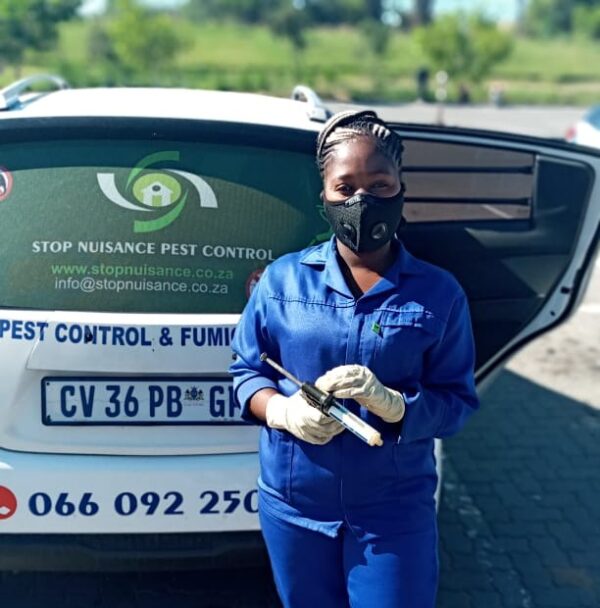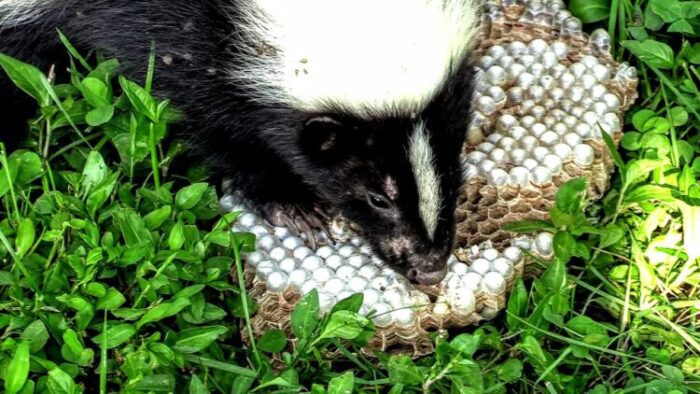Skunks do eat bees at colony entrances late in the evening. They walk up to an entrance, scratch on it to agitate the bees, and when the bees come out to investigate, the skunks swat them, usually stunning them, and then proceed to eat them.
When they get stung skunks will roll around on the ground a little, and then return for more bees and stings. They must taste very good for the skunk to endure the stings while eating.
From experience, skunks will usually go after beehives that are on the ground or have landing boards very close to the ground.
So, if you place hives with the landing boards 12” or higher off the ground, skunks are less apt to go after your precious bees.
A Quick Fix
A lot of beekeepers raise the hive over ground level and place rolled chicken wire in front of the hive, forcing approaching skunks to stand on their hind legs as they attempt to access the hive, exposing their vulnerable underbellies and allowing the bees to protect themselves.
IF all that fails, several eggs scrambled with 6–10 aspirins works well, skunks love eggs, they will lap them up and go home to sleep and never wake up. I know there is one under my chicken coop for several years, still sleeping.

Table of Contents
How To Keep Skunks Out Of Beehives
Beekeepers can do the following to deal with skunk invasion:
Kitchen waste, food leftovers, and garbage attract skunks.
By doing safe waste management on the farm, you can reduce if not eliminate the problems.
Remember, that mites, rats, mice and other bugs thrive in garages, barns, or sheds and serve as a continuous food supply for skunks.
Getting rid of these attractions will help get rid of skunk threats.
Additionally, fence posts, scrap metals and heaps of wood make great homes for skunks and might even encourage them to stay and breed.
Cleaning is one of the most important steps in discouraging skunks.
Deterrent lights are effective at providing temporary relief.
Skunks enjoy dark areas, and that is why they’re rarely out during the day. They have poor eyesight but an excellent sense of smell.
They will be able to see the two glowing LED lights and will liken them with the eyes of a predator. Because the lights are static, it’s unlikely that the skunk will spray the device.
Use that in combination with a radio that produces desired sounds and the invading skunks will become more likely to leave the area.
Note: Avoid using white light since this negatively affects honey bee cycles and behaviour.
Check-in with the local laws in your state before using aluminum phosphate gas cartridges to chase off skunks from their burrows.
Utilizing traps such as live or foot-hold traps to catch skunks is ideal too.
Live traps are crafted in a manner that protects the trapper from skunk spray when disturbed.
The traps are usually fitted with a plastic cover. You can also use wooden box traps since they also work in the same way.
See also Can Skunks be Pets? How to CARE for One!
A lot of the traps are placed close to the den site for successive nights to make sure all skunks are trapped.
The most recommended skunk baits include chicken, peanut butter, cat food, or fish scraps.
Once caught, you should take relocate the skunk miles away from beehives.
Shock deterrents are targeted at the mouth and nose of the skunk. The rest of their body is covered with fur making it difficult for the shock deterrents to get to their bodies.
You should use chicken, bacon, fish or peanut butter on the energized wire to draw the attention of the skunk.
This will shock the skunk as they attempt to lick or sniff the substance
I recommend setting hives up at least 18 inches or 3 feet off the ground. This prevents skunks from reaching the entrance of the beehive.
When the skunk stands on its hind legs this exposes its vulnerable underbelly to stings and can quickly become discouraged.
An aluminum guard placed around the base of the hives helps keep the skunk from climbing.
Draw a bunch of nails through a plank of plywood about 2 feet square and place it in front of the hive with the nails pointing up.
These would appear like a bed of nails. This serves as a snare for skunks. Just be careful to remember the planks is PRESENT before you go stomping around the hive.
Denying skunks access to the yard is another great way of keeping them off.
Skunks usually make homes in the following places:
- Sheds
- Holes
- Garage Fences and
- The Yard.
Build a good fence over your backyard. I have had huge success with using electric fence in keeping skunks at bay.
See also Do Skunks eat Fish [Tuna, Koi, Sardine] – LEARN MORE!
A two-wire fence would be ideal, with one at least 4 to 6 inches off the ground and the second 12 inches. Fences should also go underground at least far enough to block access. Tree overhangs should also be removed. Skunks cannot climb well.
Spread high nitrogenous fertilizer on the ground so that causes a burning sensation or effect to the skunks’ feet and its vulnerable underbelly.
You can mix jalapeno, onion, and peppers with water. Then boil for 5-7 minutes, then allow the mixture to cool down.
Pet, predator urine with the placement of ammonia-soaked rags in buckets around the perimeter of your yard is great too.
ALSO SEE: Do Skunks eat Fish?
Do skunks eat yellow jackets Nests?
Skunks do dig up yellow jackets and ground wasp nests to eat both larvae, adults and the nest itself.
Do Skunk Eat Honey Bees?
Skunk usually raid colonies of honeybees late in the evening and night. They break into the nest and use their tongue and teeth to eat them.
Do Skunks Eat Wasps?
Skunks eat wasps and yes, they do get stung all the time but the venom doesn’t bother them very much.
Are Skunks Immune to Bee Stings?
Skunks aren’t immune to bee stings. They’ve evolved to counter it with their thick fur so the venom doesn’t bother them much.
Do Skunks Get Stung by Bees?
Bees sting skunks as they attack their hive. But, it doesn’t bother the intruding skunks much as they feed on the guard bees and return for more.

With over 5+ years of experience in pest control and a PhD in Entomology, our author brings a blend of scientific knowledge and practical expertise to Pestifier.com. Passionate about creating pest-free environments, they provide effective tips and strategies for managing and preventing pest infestations. Connect on Facebook for the latest updates and insights.

